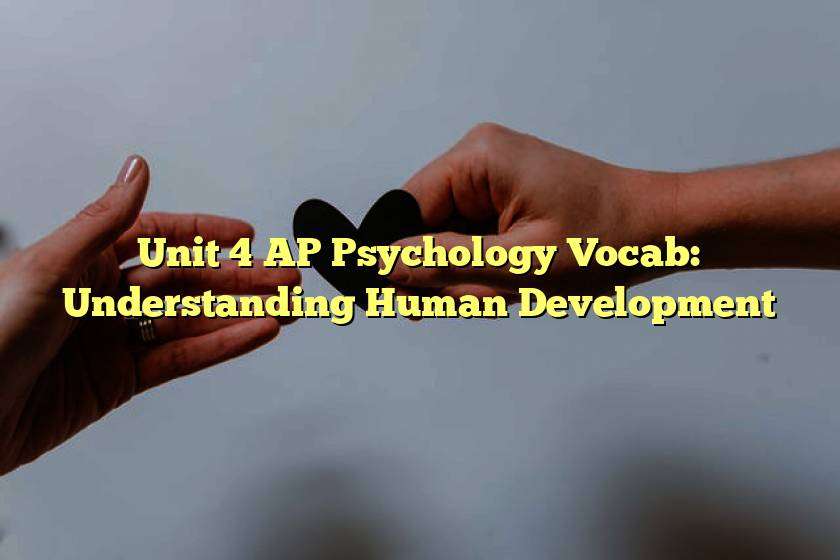The study of human development is a complex and fascinating subject, and it is a crucial area for psychologists to understand. As a copywriter fluent in English, I understand the importance of high-quality content that stands out from the competition. And if you’re looking for information about human development, you’ve come to the right place.
In this article, we’ll explore the vocabulary and concepts from Unit 4 of the AP Psychology course, which covers the developmental psychology of human beings. From infancy to old age, the human lifespan is an ever-evolving journey, marked by physical, psychological, and social changes that shape our personalities and behaviors.
So let’s dive into the vocabulary that will help you gain a more in-depth understanding of this fascinating topic.
Prenatal Development
Humans begin to develop in the womb of their mothers, and prenatal development is the process by which a zygote — a fertilized egg — grows and develops into an embryo, fetus, and eventually, a fully-formed human being.
Some key terms related to prenatal development include:
- Teratogens: agents, such as drugs or chemicals, that can cause birth defects if they are ingested by the mother during pregnancy.
- Fetal Alcohol Syndrome (FAS): a disorder caused by the mother’s consumption of alcohol during pregnancy that can lead to physical and mental abnormalities in the developing fetus.
- Critical period: the period of time during which a developing fetus is particularly vulnerable to damage or harm from external influences
Infancy and Childhood
Infancy and childhood encompass the first years of life, from birth to adolescence, during which children undergo rapid physical, cognitive, and socioemotional development. This developmental period is a crucial one, as it lays the foundation for future growth and learning.
Here are some important terms related to infancy and childhood:
- Schema: mental templates or structures that help individuals organize and interpret information about the world.
- Assimilation: the process by which individuals incorporate new information into existing schemas.
- Accommodation: the process by which individuals modify existing schemas to accommodate new information.
- Sensorimotor stage: the stage of cognitive development according to Piaget’s theory, during which infants learn through their senses and movements.
- Attachment: the emotional bond between an infant and their caregiver, which is crucial for healthy infant development.
Adolescence
Adolescence is the stage of development that occurs between childhood and adulthood, characterized by significant physical, cognitive, and socioemotional changes. Adolescents may struggle with issues related to identity, peer pressure, and sexuality, making this stage of development a particularly challenging one.
Here are some terms related to adolescent development:
- Puberty: the stage of physical development during which young people reach sexual maturity.
- Identity vs. role confusion: the fifth stage of Erikson’s psychosocial theory, during which adolescents struggle to establish a sense of self and may experience confusion and uncertainty.
- Imaginary audience: the belief, common among adolescents, that they are the center of attention and that others are constantly watching and judging them.
- Personal fable: a cognitive distortion common among adolescents that leads them to believe that they are unique and invulnerable to harm.
Adulthood
Adulthood is the stage of development that follows adolescence and lasts throughout the rest of a person’s life. During this time, individuals continue to experience physical, cognitive, and socioemotional changes, but at a slower pace than during earlier developmental stages.
Here are some terms related to adult development:
- Intimacy vs. isolation: the sixth stage of Erikson’s psychosocial theory, during which young adults seek out intimate relationships and may struggle with feelings of isolation and loneliness.
- Generativity vs. stagnation: the seventh stage of Erikson’s psychosocial theory, during which adults try to find meaning and purpose in their lives and may feel stagnant or unfulfilled if they don’t.
- Ageism: discrimination or prejudice against individuals based on their age.
- Menopause: the natural decline in reproductive hormones, which occurs in women as they age.
Conclusion
In conclusion, understanding human development is a complex task, but it is crucial for psychologists to be able to identify and explain the various changes in human behavior and personality across the lifespan. By familiarizing yourself with the key terms and concepts of Unit 4 of the AP Psychology course, you can begin to develop a deeper understanding of the fascinating world of human development.
So why not start exploring today? Use this article as a launching point for further research, and you never know where your curiosity might take you.



